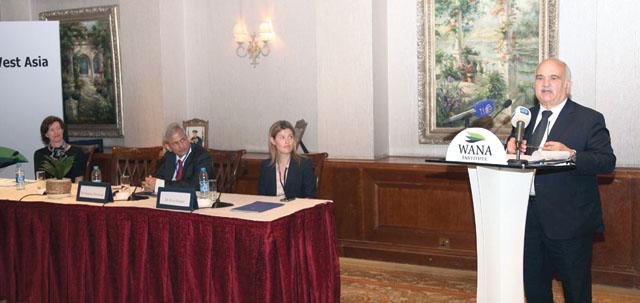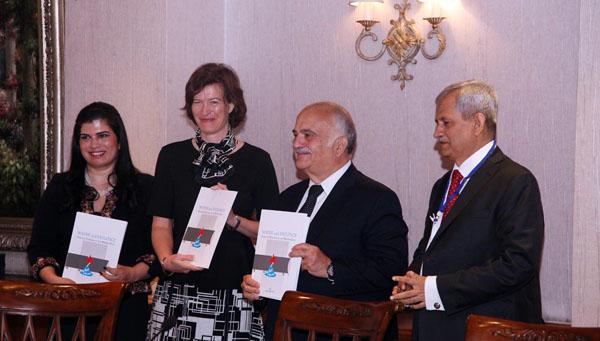You are here
Prince Hassan calls for forming West Asian commission for water
By Hana Namrouqa - Mar 21,2015 - Last updated at Mar 21,2015

AMMAN — HRH Prince Hassan has called for the creation of a West Asian commission for water and energy management.
Underscoring the importance of developing a sense of regional well-being and humanising the water discourse, Prince Hassan highlighted that water cooperation in West Asia and North Africa (WANA) is not yet a thematic or regional approach.
“When you look in theory to the great Euphrates and the Tigris, and the Nile and the rivers of Syria, and the blue gold project in Lebanon, you ‘say my goodness, there is a lot going on in terms of the future of water,’ but in reality this is not yet a thematic approach, it is not yet a regional approach, it is not yet a question of inter-sectoral cooperation,” Prince Hassan, WANA Institute chairman, said Thursday.
Speaking at the “International Conference on Exploring the Water-Peace Nexus — Blue Peace in West Asia”, which concluded last week, he identified territoriality, identity and migration as the region’s challenges.
“Is it not time to consider the creation of the universal zakat [Islamic tax on income] fund… isn’t it time that we recognise the importance of zakat, in joining zakat with the international call for justice?” Prince Hassan asked.
He called on policy makers to develop inter-state strategies with a human dignity-focused approach, so as to improve water security for the people of countries in the WANA region.
The prince also called for West Asian-North African cooperation and dialogue on water, energy, and the human environment, noting that “only through nexus thinking, can we imagine a region fit for future generations.”
WANA is among the world’s most water-scarce regions, as naturally low rainfall combined with poor governance and overconsumption of water is driving an increasing gap between water supply and demand, according to the WANA Institute.
During the two-day conference, regional and international policy makers, technical experts and academics exchanged water cooperation experience, and explored the linkages between water security, agriculture and food security, and the impact on vulnerable populations.
The event was co-hosted by Strategic Foresight Group (SFG) and WANA Institute, in partnership the Swedish International Development Cooperation Agency, the Swiss Agency for Development and Cooperation and the GIZ.
The conference was organised under the Blue Peace Initiative, which seeks to develop shared water resources and turn water from a potential tool of war into a means to achieving regional peace.
SFG President Sundeep Waslekar said it is about time that leaders and people of the region respond to inter-linked strategic problems on an emergency basis with a spirit of compassion and cooperation.
“The Blue Peace process can help in this endeavour with its objective of turning water from a source of crisis into an instrument of peace,” Waslekar noted.
During the conference, Prince Hassan launched two reports compiled by SFG — the “The Hydro-Insecure: Crisis of Survival in the Middle East” and “Water and Violence: Crisis of Survival in the Middle East.”
Swedish Ambassador to Jordan Helena Gröndahl Rietz said the reports are contributions “to our understanding” on how water management, at the local, national and regional levels, is closely linked to security, and economic and social development.
“In this regard, I would like to highlight the need to strengthen the role of women in our water programmes and work towards truly inclusive water solutions,” Rietz noted.
Related Articles
A lack of political will and a deficit of trust in the Middle East hinders the region from reaching an inclusive understanding on water, a rare commodity in the region, according to an expert on conflict resolution.
Around 80 regional and international water experts, lawmakers and academics are scheduled to convene in Amman on Wednesday to share experiences on water cooperation and propose solutions to prevent water sources from becoming tools of war, organisers said on Monday.
More than 40 million people in Iraq, Jordan, Lebanon, Syria and Turkey are water vulnerable, 3 per cent or 1.7 million of whom are in the Kingdom, according to a report on violence and water shortage.

















